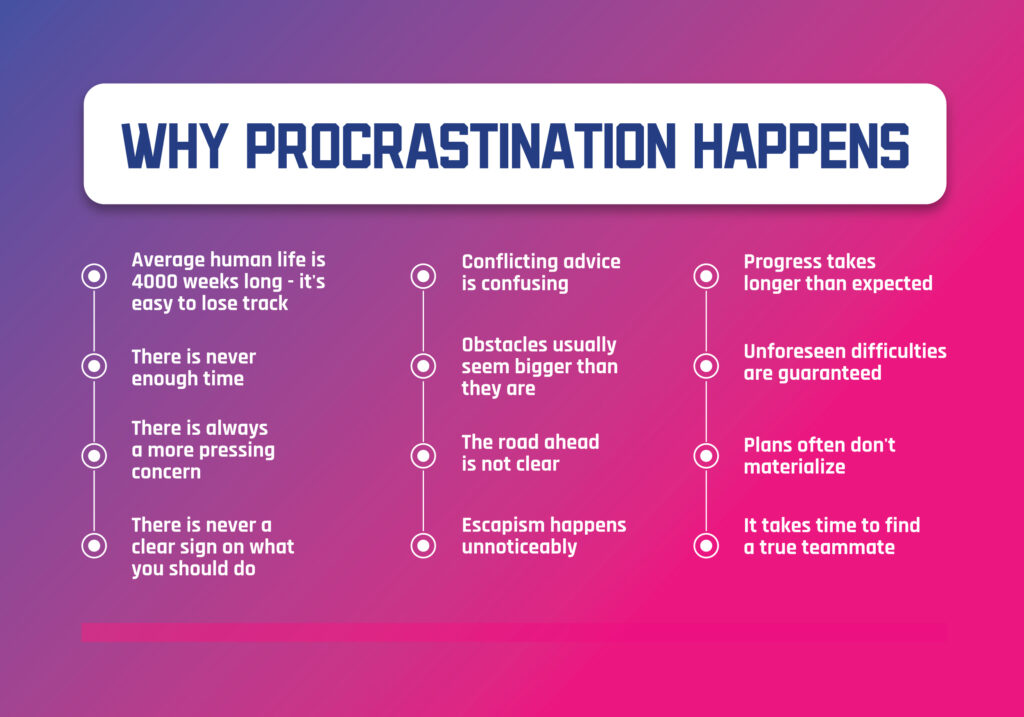Procrastination is a common issue that affects people from all walks of life. It’s the act of delaying or postponing tasks, often leading to increased stress and reduced productivity.
While it might seem like a simple matter of poor time management or laziness, procrastination is often driven by deeper emotional and psychological factors. Understanding why we procrastinate and finding effective strategies to overcome it can help us lead more productive and fulfilling lives.
Why do we procrastinate?
According to researchers, procrastination is not a time management problem, but a coping mechanism.
We procrastinate for a variety of reasons, many of which are rooted in psychological and emotional factors. Fear of failure often leads people to delay starting tasks because they worry about not meeting expectations. Lack of motivation and interest can make tasks seem unimportant or boring, leading to avoidance.

Feeling overwhelmed by the complexity or size of a task can cause indecision and hesitation, while poor time management skills exacerbate the tendency to put off work. Additionally, distractions, especially in the digital age, provide immediate gratification that is more appealing than tackling challenging tasks.
Perfectionism, low self-esteem, and the natural human inclination for immediate rewards over long-term benefits also play significant roles in why we procrastinate. Understanding these underlying causes can help us develop strategies to overcome procrastination and improve productivity.
Effective Tips to Overcome Procrastination
According to some psychologists, procrastination is not simply due to laziness or poor time management skills. Instead, research indicates that it is driven by our emotions. By learning to manage negative emotions effectively, we can overcome procrastination.
Here are some practical techniques to conquer procrastination and boost your productivity.
1. Break Tasks into Smaller Steps
One of the primary reasons people procrastinate is that tasks often appear overwhelming. Dividing large projects into smaller, manageable steps can make them feel less intimidating.

Instead of thinking about writing an entire report, focus on completing the introduction first. Creating a step-by-step plan not only makes the task more approachable but also provides a sense of accomplishment as you complete each segment.
2. Set Specific Goals
Setting specific, achievable goals can give you a clear direction and purpose. Instead of saying, “I need to study,” set a goal like, “I will review chapters 3 and 4 of my biology textbook for the next hour.” Clear goals help you stay focused and motivated. Write down your goals and keep them visible. This constant reminder can keep you on track and prevent you from drifting into procrastination.
3. Use the Pomodoro Technique
The Pomodoro Technique is a time management method that promotes working in short, focused intervals. Set a timer for 25 minutes and concentrate on a single task without interruptions. When the timer rings, take a five-minute break. After four such intervals, take a longer break of 15-30 minutes.

This technique can help maintain focus and reduce the urge to procrastinate by creating a sense of urgency and structure.
4. Eliminate Distractions
Distractions are a significant contributor to procrastination. Identify what commonly distracts you—whether it’s social media, TV, or a noisy environment—and find ways to eliminate or reduce these distractions. Turn off notifications on your phone, use website blockers to prevent access to distracting sites, and create a dedicated workspace that is free from interruptions. Minimizing distractions can help you stay focused and increase your productivity.
5. Prioritize Tasks
Not all tasks are created equal. Some tasks are more important and time-sensitive than others. Utilize a prioritization method such as the Eisenhower Matrix to classify tasks according to their urgency and importance. Focus on completing high-priority tasks first, which can help you manage your time more effectively and prevent procrastination. By tackling important tasks early, you’ll reduce the stress of looming deadlines and free up time for other activities.
6. Develop a Routine
Establishing a daily routine can create a sense of normalcy and discipline that helps combat procrastination. Designate specific times for work, study, and breaks. Consistency can train your brain to expect and adapt to these patterns, making it easier to start tasks on time. A well-structured routine reduces the likelihood of procrastination by creating a predictable and organized schedule.
7. Practice Self-Compassion
Beating yourself up for procrastinating can be counterproductive. Instead, practice self-compassion. Understand that everyone procrastinates at times, and it’s okay to make mistakes. Acknowledge your setbacks, but don’t dwell on them. Use them as learning experiences to improve your time management and productivity strategies. Being kind to yourself can reduce anxiety and create a more positive mindset, which is essential for overcoming procrastination.
8. Find Motivation and Accountability
Motivation can be a powerful antidote to procrastination. Find what motivates you—a reward, a personal goal, or a supportive friend or colleague. Share your goals with someone who can hold you accountable. Regular check-ins with an accountability partner can encourage and help you stay committed to your tasks.
9. Visualize Success
Visualization is a powerful tool to conquer procrastination. Spend a few minutes each day imagining yourself successfully completing your tasks. Visualize the positive outcomes and the sense of accomplishment you’ll feel. This mental exercise can boost your motivation and make it easier to start and finish tasks.
Conclusion
Procrastination is a habit that can be overcome with the right strategies and mindset. You can take control of your time and productivity by breaking tasks into smaller steps, setting specific goals, using techniques like the Pomodoro Method, and eliminating distractions.
Remember to prioritize tasks, develop a routine, practice self-compassion, find motivation, and visualize your success. With these practical techniques, you can conquer procrastination and achieve your goals more effectively. Start today, and watch your productivity soar!













